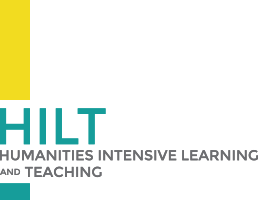
On June 16, 2017, Data & Society Research Institute’s Speculative Fiction Reading Group will host Future Perfect, a conference exploring the use, significance, and discontents of speculative design, narrative, and world-building in technology, policy, and culture.
The past year has been marked by frequent commentaries comparing the present moment to works of dystopian literature and speculative fiction. The sentiment that science fiction futures can’t keep up with present-day developments pervades discussions of policy, technology, and culture. But the extent to which fictional futures exercise power over our present is, in some cases, by design. For example, the influence of 2002’s Minority Report on gestural interfaces, surveillance technologies, and automation isn’t an accident of history–the future envisioned in the film was created in close consultation with technologists and academics actively working on products that the film imagines in real-world settings. An entire industry of speculative designers and futures consultants continues to actively construct dystopian futures on behalf of corporations and governments, transforming TED talks and architectural renders into self-fulfilling dystopian prophecy.
In a moment when the future increasingly feels like a foregone conclusion, Future Perfect will bring actors from a variety of world-building disciplines (from art and fiction to law and science) together to explore the uses, abuses, and paradoxes of speculative futures.
Topics of particular interest include, but are not limited to:
- The history and political economy of the future (subtopics here might include divination, scenario planning and war games, and predictive modeling)
- Analyses of specific SF works that have uniquely influenced technology, politics, and/or aesthetics
- Challenges to dominant future narratives in popular culture and representation in speculative fiction
- Why Silicon Valley venture capitalists seem to think Snow Crash was a playbook for the next twenty-five years and not a dystopian hellscape
- That one scene in Minority Report with the cereal box that is literally the only really important part of the film
Proposed contributions may include, but are not limited to:
- Academic Papers
- Fiction
- Performance
- Video
- Games
The conference will be livestreamed and documentation of participating projects will be posted online.
Participation requirements
Participation in this event is limited. Those who are interested should apply by May 12, 2017. We are interested in having a wide range of disciplines represented, including designers and artists, academics, performers, programmers, lawyers, journalists, scientists, and of course fiction writers. All participants agree to inclusion in the conference’s online documentation.
Schedule
Thursday, June 15, 2017 (optional)
7-10pm Screening and Reception
Friday, June 16, 2017
12-6pm The Conference
The Conference itself will morph to fit the selected participants, and includes a welcome lunch, 2-3 themed sessions showcasing work and framing participation, and other potential modes for engaging with our theme.
Application
If you are interested in attending this Conference, you may either 1) propose work to be exhibited and/or presented, or 2) describe how your work makes you a relevant discussant/participant.
By Friday, May 12th, please submit the following here:
1. Name, address, affiliation, discipline.
2. A 1-page (max) description of your work and relevance to the event. Be sure to indicate whether you’re applying to present your work, or to contribute to the discussion.
- I have something to present.
- I don’t have a presentation but believe I could contribute to the discussion.
3. At least one link or attachment exemplifying what you’d share if selected.
4. Bio/CV
5. (optional) Travel support request
If you are in need of travel support, please let us know. Funding is limited; we will not be able to accommodate all travel needs so if you have grants or other means of covering your participation, please use that so that we can prioritize stipends for those who have none.
Dates
Application Deadline: May 12, 2017
Selection Notifications: May 24, 2017
Public Announcement: June 2, 2017
Conference: June 15-16, 2017
Questions? Contact cj@datasociety.net









